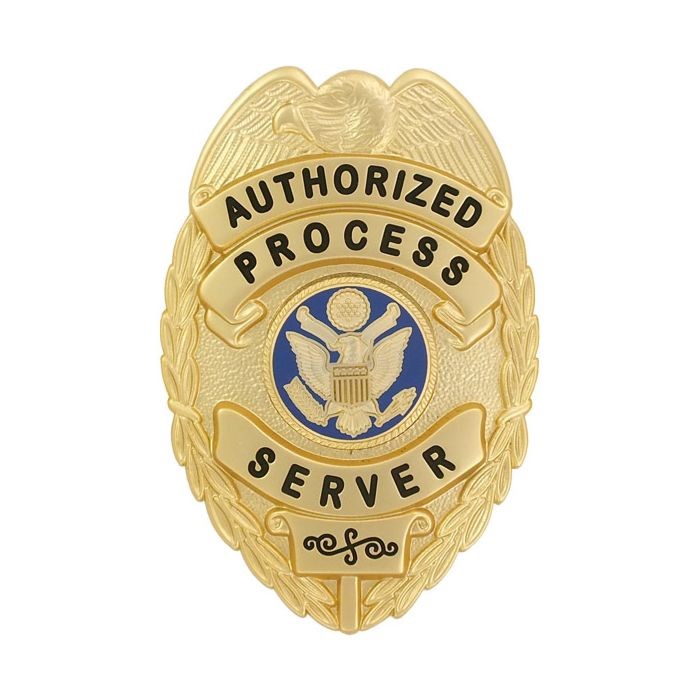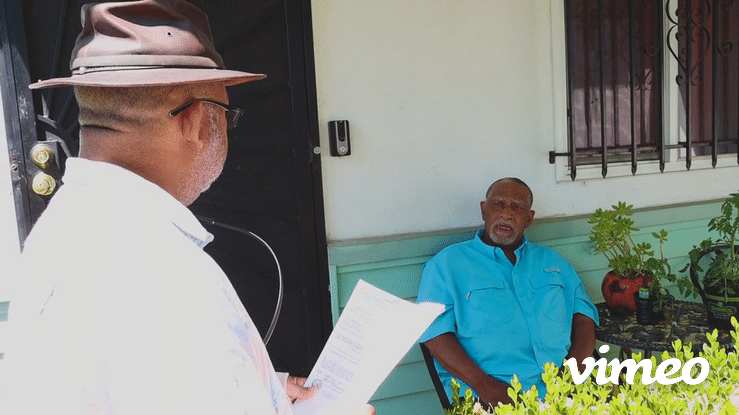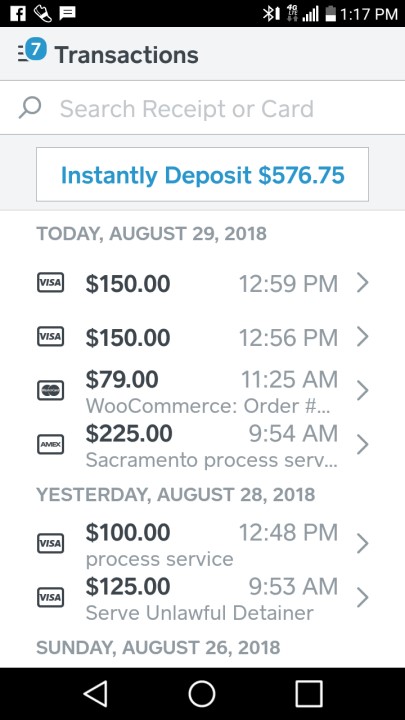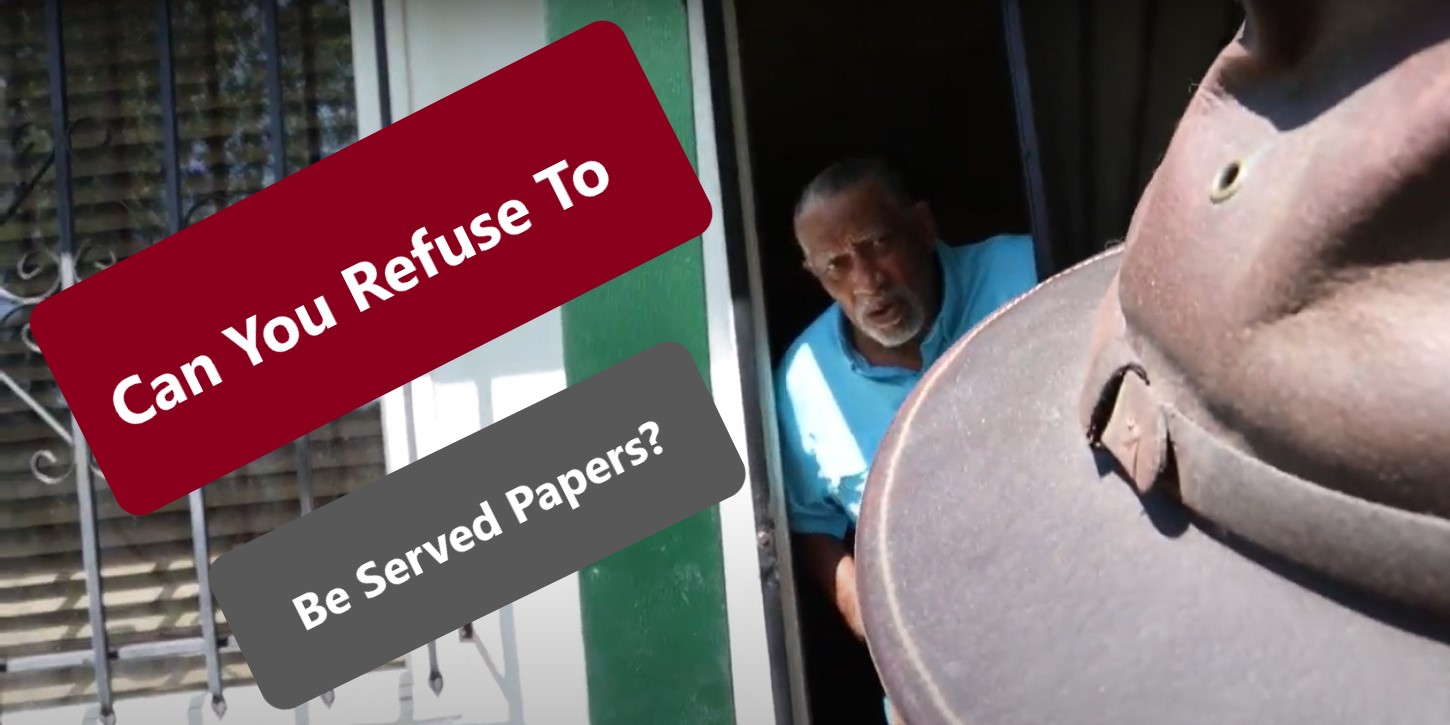Category: Process Server Training
Can A Process Server Wear A Badge?

Process Server Training – How To Become A Process Server?
Can A Process Server Wear A Badge?
I created my own custom process server badge. I bought a badge holder from amazon and used it to wear my authorized process server badge attached to my shirt.
You will receive registered process server badge / Process Server ID from the recorders office in California.
You have to check the process server laws in your state to see if you can wear a badge process server.
Where to find process server badges for sale?
How to Become a Process Server in California

Need Documents Served? Click "Serve Now" Button Below.

My Gift To You. Get A Free Copy Of My Book "How To Become A Process Server"
Complete The Form Below. I will email you a PDF copy of my eBook.
Free Ebook
I am giving you a free copy of my eBook "How To Become A Process Server". After you submit your name and email, you will be redirected to our Process Server Training Academy YouTube Channel. Please subscribe to our channel. Our YouTube channel has great information on being a Process Server. You will also receive an email that you have to confirm to receive a PDF copy of our eBook.
Online courses with Lance Casey
Do You Want To Become A Process Server and Make Over $150 Per Hour?
Click the button below to take our “How To Become A Process Server Training Course”.









Hey!
I Am Lance Casey.
With over 20 years of private investigation and process server experience expertise, I help people become process servers and start their own process server businesses. In the constantly changing field of process serving, it is my mission to provide individuals and small businesses with the skills to master the critical tactics and strategies that will drive their business growth.
Become A Process Server
Great for people who like to drive but don’t want a bunch of passengers in the car.
Process Server Websites
Learn how to build a process server WordPress website.
Process Server Software
Generate affidavits, manage billing, payments to servers, update jobs from the field.
Learn How To Become A Process Server
Process Server Training: What You Need to Know
Have you been considering getting into a different line of work? Perhaps you want to start your own business and are looking for something interesting and a bit different from the usual entrepreneurial outlets. Becoming a process server could be just the new career that would fit you well.
Of course, if you are like most people, you have only a vague understanding of what a process server does and even less of an idea on how to become one. Let’s get a closer look, so you can see whether it might be a new type of work that could appeal to you.
What is a Process Server?
The job of a process server is to deliver legal documents to someone who is involved in a court case as a defendant. Another term often used for this is “serving papers”. In many cases, these types of documents can’t simply be mailed to the person involved in the court case because they may claim that they never received the papers. Instead, they need to be served with the papers by someone in person. This could occur at their home or their place of business, for example.
The documents let the person being served know when they need to appear in court and why they need to appear.
Of course, when people know that they may be served with papers, it can sometimes be difficult for the process server to find them. They will take great pains to avoid the process server. This means the job of the process server entails a bit more than just handing over papers. It involves time and work to learn about the best places and times to find the defendant and to serve the papers.
Typically, the process server begins their search with the last known address. While this can be helpful in some cases, that address is often not current. The process server needs to determine where the defendant is located and the best way to approach them. Naturally, this can take some time, effort, and detective work. However, that’s part of the draw to this job. Process servers can use their knowledge and skills to find their quarry and deliver the papers.
Why Are Process Servers Needed?
Process servers provide an important service. The 5th Amendment of the US Constitution essentially means that all citizens are granted the right to know when they are being summoned for a court case against them. The other party is required to provide notice of legal action being taken against them, and this is where process servers come into play.
In some cases, particularly with smaller towns, the sheriff’s office will deliver the papers. However, these departments are often too busy with other matters to handle the delivery of papers. The process servers provide this service instead. After serving the papers, the process server will then fill out the proof of service forms and file them with the court. This shows that they have delivered the papers to the defendant. The affidavit will be notarized and provided to the person or law office that hired the process server. Process servers can also file papers in court for their clients in many cases.
Process servers can serve many different types of papers for course cases. Some of the different types of documents that could be served include writs, subpoenas, complaints, and summonses. The job might also require serving civil summons, civil complaints, garnishments, divorce papers, child support, orders of protection, collection letters, and more. Some process servers will also offer document retrieval services.
Given the types of work that servers do, it is beneficial to have good investigative skills and a desire to see work through from start to finish. In some cases, the process server can perform surveillance, stakeouts, and skip tracing.
Pros and Cons of Being a Process Server
As with any career, there are pros and cons to working as a process server. One of the biggest benefits is that you can become your own boss and set up your own hours. As long as you can serve the papers, you can do it on your own schedule. You can work the hours you need, and this helps many people to have a better work/life balance.
Because process servers are an essential part of the legal system, you will find that this can be a stable career, especially after you start to gain more clients. You may not become rich overnight as a process server, but it can provide you with a steady income. When you invest your time into the business, you can see great results.
One of the other benefits is that you won’t have two days in a row that are the same. You are always dealing with new people who need to be served papers. Every day will be an adventure.
Process servers tend to spend a lot of time in their vehicles, as well. For some, this can be a benefit, but others may not like being in the car that much. If you don’t like driving and spending time in the car, this is something to consider.
Another con of being a process server is that you are often dealing with people who don’t want to get served. Although most people will be quiet when being served, they can sometimes be nasty about it and take out their anger on you.
Other than that, there aren’t many cons to becoming a process server. It can be a wonderful job and a way to start a business of your own without much cost.
What Do You Need to Do to Become a Process Server?
In some cases, a process server might have some legal experience already. Some may be former law enforcement officers, for example. Others may have no legal experience at all. There is no single background that will make an ideal process server. Those who are willing to learn and to put in the work can have a career in this field. However, it is important to note that the requirements for becoming a process server can vary greatly from one state to the next.
In most states, you will need to be at least 18 years old to become a process server. Also, you can’t serve papers if you are involved in the case. This means that an attorney can’t serve papers for their client in a case they are handling, for example. In some cases, you will need to be licensed by your state or by the county where you will be working. Other states do not have any requirements for licensing or registering to be a process server, which means that not all states will have any mandatory training.
However, even in states where training may not be required, it is always a good idea to get some training for yourself. Find a course or program that can provide you with all of the information you need when it comes to how to serve papers safely and effectively. Often, process servers will want to get other training and education to improve their investigative skills and knowledge. This can make it easier to find and serve papers.
When you become a process server, you should always make it a point to familiarize yourself with the laws and regulations regarding the process serving. You need to be sure that you are abiding by the laws in your state, so you do not infringe on the rights of others during the course of serving papers.
Statewide licensing is required in Alaska, Arizona, California, Nevada, Oklahoma, and Texas. Washington and Montana require registration, while Georgia requires certification. Local licensing is required in certain locations, as well, including certain counties in Florida, New York, Missouri, and Tennessee.
Always take the time to look up the requirements in your location to be sure you understand each of the steps you will have to take to become a process server.
An Example: Becoming a California Process Server
If you are located in California and you want to become a process server, you will have to meet certain requirements and go through several steps. Those who serve more than 10 papers in a given year will need to be registered in the county where they serve. Registration is statewide, and those who want to become registered need to be a resident of the state for at least one year immediately before filing for registration.
How To Become A Process Server
The state does not have any education or testing requirements. However, applicants are required to post a $2,000 cash deposit or bond. Those who have a criminal history as a felon cannot become process servers in the state. You need to be at least 18 years old and you will need to have two passport-style photos.
Applicants will have to complete a registration form and will need to be fingerprinted. The fingerprinting is to ensure that the applicant hasn’t been convicted of a felony. The Livescan fingerprint form will be signed by law enforcement. The applicant will then need to contact a surety company or insurance company to obtain a bond. The bond for $2,000 needs to be valid for the term of the registration, which is two years in CA.
With your registration form and ID, you can then register at the county clerk’s office. You can then provide the registration form and the Livescan form to the county clerk. You will also need your bond, two passport photos, and all of the fees. The fees can vary based on the county, so be sure that you check the fees before you head to the county clerk’s office.
Once all of this is complete, you will then be registered to act as a process server. You will then be able to start finding work in the field.
Getting Work as a Process Server
One of the biggest challenges that new process servers face when starting is finding clients. There are several ways to increase the number of clients that you have. The first is being proactive and calling law firms, legal centers, rental agencies, mortgage lenders, etc. that may require the needs of a process server. Consider all of the different types of paperwork that can be served and the type of people that need to have papers served. Contact those businesses and let them know that you are available. Networking with people and learning their needs, and actively seeking clients can help you to build up a client list.
How To Become A Process Server. When you have several large clients, such as law firms, you will find that it becomes easier to have steady work. However, you shouldn’t rest easy even when you have a couple of larger law firms that use your service. Always look for new clients. It’s better to have too much work rather than not enough.
Become a process server additionally, you should consider building a website and blog, which you can use to market your services online. This allows people to find your company online and come to you rather than you needing to go to them all the time.
If you want to keep clients and get new clients, you need to be good at your job. Remember, it’s not just about handing someone paperwork. It’s about putting in the effort to find the people you are serving, even when they don’t want to be found. Creating a reputation as someone who always finds the person they need to serve, and doing so quickly, will help you to keep your clients happy.
What Types of Skills Should a Process Server Have?
You will need to have or be able to develop certain skills if you want to thrive as a process server. Although it might not be too difficult to become a process server, being good at the job and becoming successful can be tricky. Think about the sorts of skills that are needed for this job.
You should be good at reading people and situations. Sometimes, you will be serving papers to people who are at a rough spot in their lives. They can sometimes be defensive and difficult to talk to because they don’t want to be served. They might lie to you, run from you, or even attack you.
While the job of a process server is not too dangerous, there is always the risk of someone becoming angry and aggressive. If there are threats of violence or actual violence, it should be reported to the police. Process servers need to be ready for anything, especially when dealing with someone desperate.
While the need to defend yourself is not usually a concern, it could still be a good skill to have just in case. It is always better to be safe rather than sorry. You will also find that your ability to empathize and talk people down from being angry are good assets to have. You need to know how to read people and how to determine the best places and the best ways to approach different people.
You also need to have thick skin when you are a process server. As mentioned, people will often lie to you. They might also insult you. You have to remain calm and have the ability to not let those verbal attacks feel personal. The ability to keep calm and rational even when dealing with irate people is essential.
Another skill that is needed is persistence. Process servers will soon find that some people really don’t want to be found and served with papers. They will hide and do just about anything to avoid it. This requires an investigative mind that can help you to find out where these individuals are located. You might need to talk with the person’s family or friends to get more information about them, so you can serve the papers. You may need to research the person’s past to get a better idea of where they might be now. Although you aren’t a private investigator, some of the work can rely heavily on investigation.
Of course, this also means that you need to be patient. While some jobs are simple and will be over in an hour or so, others might take days or longer to complete. You can’t let setbacks make you give up. Without persistence and patience, you will find that it could become overwhelming.
This is why having the proper training, even though it might not be required by the state, can be very beneficial. The more training you have the better you will feel about serving papers in different situations.

How Much Does a Process Server Make?
Of course, you are likely wondering just how much a process server can make. The amount can vary depending on several factors including the types of papers being served, as well as your location. The number of papers you serve will determine how much you make, as well. Typically, the salary for a process server will be from $25,000 to $70,000 annually. They will make between $30 and $250 per document.
You will want to check into your local area to get a better sense of how much money you could make as a process server. In some cases, you may want to start out doing the job part-time. You can see whether it is a good fit for you and make some extra money on the side. If you decide that it’s something you want to pursue, you can then expand your business and consider going full-time.
Starting Your Own Process Server Business
Starting a process server business is a fantastic move for many people. It doesn’t cost much to get started, and you can recoup your investment costs after serving a few papers in many cases. Once you become a process server, you will want to set yourself up as a business. Learn more regarding what you need to do to set up a business in your state and follow all of the requirements to ensure that you are a legitimate business.
Create a website, as mentioned, to let people know about your services and to attract new clients. Get some business cards to hand out to attorneys, law offices, and others when you are marketing in person. You should also create a marketing letter that you can provide to attorneys and other clients. Ask for referrals. Even if an attorney might not need your services right now, they could know someone who does.
Always deliver. Work hard, work fast, and provide the clients with better-than-expected results. This will impress them and make them want to hire you again and again. You can go solo in your business for as long as you would like. This is what many process servers do. Others might eventually want to expand their business further and bring in other process servers when their client list starts to become too large.
Treat this business as you would any other, and you can start to see some great results.
Should You Become a Process Server?
Only you can answer this question. Now that you have a better understanding of what a process server is and what they do, it should be easier for you to determine whether this is the type of career you might want to pursue. It could provide you with a way to earn a good income without the need to be stuck inside of an office or a cubicle all of the time.
If you are interested in becoming a process server, your next step is to take a course that will provide you with all of the details that you will need to understand to enter this field. Even if you do not need to be licensed or registered in your state, going through a course will help to ensure that you know the ins and outs of the job. It will make the transition to process served much easier for you.
Take the next step, go through a course, and start earning as a process server. Your new career is closer than you might think.
Course 1
Process Server Online Course
Basic Process Server Training Course
Course 2
Process Server Marketing Course
Process Server Website Builder Course
How To Build a process server website
Course 3
Course 4
Process Server Adwords Course
Course 5
Process Server Small Claims Court Course
Course 6
How to Launch a Successful Online Community
Resources:
Judgment Collection, Corporation Service Company dba CSC Lawyers Incorporating Service, We Buy Houses, Equifax, How To Find Someone’s Social Security Number, How To Start a Business, Private Investigator, Criminal Investigator, Rabbits For Sale, Process Server Jobs, Secretary of State Business Search, Equifax Data Breach, Wage Garnishment, Warrant Search, Wage Garnishment California, Yuba City.
Books:
How To Become a Private Investigator, How To Become a Process Server, How To Find Someone’s Social Security Number, Marketing A Process Server Business Online, How To Buy Credit Card Numbers Online
Training:
Some Feedbacks
What people are saying

Best Private Investigators in Sacramento
Best Private Investigators in Sacramento Finding the right private investigator in Sacramento matters. Whether you are dealing with a family issue, a legal case, or

Become a Process Server California: Your Guide to Starting a Career
Embarking on a career as a process server in California holds the promise of an interesting and essential role within the legal system. In my

Become a Process Server in California: Your Step-by-Step Guide
How to Become a Process Server in California Becoming a process server in California is a great way to work in the legal field without

California Process Servers License: How to Obtain Certification
Obtaining a license as a process server in California reflects a commitment to both legal protocol and ethical conduct within the field of law. I

Process Server Training California: Your Path to Professional Certification
As a professional in the legal field, my experience has shown that the role of a process server is vital. Serving legal documents is an

Process Server Certification California: Your Guide to Becoming a Legal Courier
Becoming a certified process server in California is an important step for those looking to serve legal documents professionally. This role is essential within the
Process Server Training Academy
9912 Business Park Drive Suite 170 Sacramento California 95827. (800) 395-7452- Classroom Training
- Online Training
- Field Training
How To Become A Process Server In Alabama
How To Become A Process Server In Alaska
How To Become A Process Server In Arizona
How To Become A Process Server In Arkansas
How To Become A Process Server In California
How To Become A Process Server In Colorado
How To Become A Process Server In Connecticut
How To Become A Process Server In Delaware
How To Become A Process Server In Florida
How To Become A Process Server In Georgia
How To Become A Process Server In Hawaii
How To Become A Process Server In Idaho
How To Become A Process Server In Illinois
How To Become A Process Server In Indiana
How To Become A Process Server In Iowa
How To Become A Process Server In Kansas
How To Become A Process Server In Kentucky
How To Become A Process Server In Louisiana
How To Become A Process Server In Maine
How To Become A Process Server In Maryland
How To Become A Process Server In Massachusetts
How To Become A Process Server In Michigan
How To Become A Process Server In Minnesota
How To Become A Process Server In Mississippi
How To Become A Process Server In Missouri
How To Become A Process Server In Montana
How To Become A Process Server In Nebraska
How To Become A Process Server In Nevada
How To Become A Process Server In New Hampshire
How To Become A Process Server In New Jersey
How To Become A Process Server In New Mexico
How To Become A Process Server In New York
How To Become A Process Server In North Carolina
How To Become A Process Server In North Dakota
How To Become A Process Server In Ohio
How To Become A Process Server In Oklahoma
How To Become A Process Server In Oregon
How To Become A Process Server In Pennsylvania
How To Become A Process Server In Rhode Island
How To Become A Process Server In South Carolina
How To Become A Process Server In South Dakota
How To Become A Process Server In Tennessee
How To Become A Process Server In Texas
How To Become A Process Server In Utah
How To Become A Process Server In Vermont
How To Become A Process Server In Virginia
How To Become A Process Server In Washington
How To Become A Process Server In West Virginia
How To Become A Process Server In Wisconsin
How To Become A Process Server In Wyoming
What Does A Process Server Do?
Process servers deliver legal documents to individuals involved in a court proceeding.
In California, a process server is defined as any person who makes more than 10 services of process within this state during one calendar year, for specific compensation or in expectation of specific compensation; or any corporation or partnership that derives or expects to derive compensation from service of process within this state. Laws concerning process servers are set forth in California Business and Professions Code (BPC 22350-22360).
How Much Does A Process Server Make?
I run my own process server business. You can check me out by searching “Lance Casey & Associate” in Google. I made over $800 in one day working for myself as an Independent Process Server. Not working for someone else.
California process server licensing Requirements:
- Must be at least 18 years of age
- Cannot have a felony conviction
- Cannot be a party to the action in which they are serving process (i.e., Plaintiff, Defendant, Petitioner, Respondent)
- Must perform their duties in compliance with provisions of state and local laws governing the service of process
- Must register with the County Clerk of the county in which they reside or have their principal place of business
Steps To Become A California Registered Process Server
To register as a process server in California, you must appear in-person at one of our office locations and:
- Present valid photo identification (such as a driver’s license, passport, or military I.D.)
- Present a process server bond in the amount of $2,000 which names the registrant as principal and provides the term of the bond
- Complete an application form:
- Get fingerprinted using a completed Request for Live Scan Service issued by this office
- Pay the appropriate fees*
Fees
File registration: $110.00
File bond: $10.00
Record bond*: $20.00 for the first page and $3.00 for each additional page (including any lead page)
Each additional ID card: $37.00
Live Scan fingerprinting: $49.00 (Note: You are responsible for the rolling fee payable to the agency performing the Live Scan service. Rolling fees vary by service provider. Visit the Attorney General’s website to search for live scan locations.)
Choose the County that you reside or where your process serving business is located to obtain the process server application.
Alameda County Recorder
1106 Madison Street, 1st Floor
Oakland, CA 94607
Email: Vitalrec@acgov.org
Office: (510) 272-6362
FAX: (510) 208-9957
Alpine County Recorder
County Administration Building
99 Water Street
Mail to: P.O. Box 155
Markleeville, CA 96120
Office (530) 694-2283
FAX (530) 694-2491
Amador County Recorder
Amador County Recorder
810 Court Street
Jackson, CA 95642
Office (209) 223-6468
FAX (209) 223-6204
Butte County Recorder
155 Nelson Avenue
Oroville, CA 95965
Email: clerk@buttecounty.net
Office (530) 538-7690 and 91
FAX (530) 538-7975
Calaveras County Recorder
Government Center
891 Mountain Ranch Road
San Andreas, CA 95249
Office (209) 754-6372
FAX (209) 754-6733
Colusa County Recorder
546 Jay Street, Suite 200
Colusa, CA 95932
Office (530) 458-0500
FAX (530) 458-0512
Contra Costa County Recorder
555 Escobar Street
Martinez, CA 94553
Office (925) 335-7900
Del Norte County Recorder
981 H Street, Suite 160
Crescent City, CA 95531
E-mail: clerkrecorder@co.del-norte.ca.us
Office (707) 464-7216
FAX: (707) 465-0321
El Dorado County Recorder
360 Fair Lane
Placerville, CA 95667
Email: recorderclerk@co.el-dorado.ca.us
Office (530) 621-5490
FAX (530) 621-2147
Fresno County Recorder
2281 Tulare Street, Room 302
Fresno, CA 93721
Mail to: P.O. Box 766
Fresno, CA 93712
Office (559) 600-3476
FAX (559) 600-1484
Glenn County Recorder
516 West Sycamore Street
Willows, CA 95988
Email: gcboard@glenncounty.net
Office (530) 934-6412
FAX (530) 934-6305
Humboldt County Recorder
825 Fifth Street, Fifth Floor
Eureka, CA 95501
Office (707) 445-7382
FAX (707) 445-7430
940 West Main Street, Room 202
El Centro, CA 92243
Office (760) 482-4272
FAX (760) 482-4271
Inyo County Recorder
168 N. Edwards Street
Independence, CA 93526
Mail to:
P. O. Box Drawer F
Independence, CA 93526
Office (760) 878-0222
Fax (760) 878-1805
Kern County Recorder
1655 Chester Avenue
Bakersfield, CA 93301
Email: kcrecorder@co.kern.ca.us
Office (661) 868-6400
Fax (661) 868-6432
Kings County Recorder
1400 West Lacey Boulevard
Hanford, CA 93230
General Info (559) 582-3211 ext. 2470
FAX (559) 582-6639
Lake County Recorder
Richard A. Ford
Lake County Recorder
Courthouse
255 North Forbes Street
Lakeport, CA 95453
Email: Recorder@co.lake.ca.us
Office (707) 263-2293
FAX (707) 263-3703
Lassen County Recorder
220 S. Lassen Street, Suite 5
Susanville, CA 96130
Email: lcclerk@co.lassen.ca.us
Office (530) 251-8234
FAX (530) 257-3480
Los Angeles County Recorder
12400 East Imperial Highway, Room 1002
Norwalk, CA 90650
Mail to: P. O. Box 489
Norwalk, CA 90651-0489
Email: recorder@rrcc.lacounty.gov
Recording (562) 462-2137 or 800-201-8999
FAX (562) 807-3726
Madera County Recorder
County Government Center
200 West 4th Street
Madera, CA 93637
Email: countyclerkinfo@madera-county.com
Office (559) 675-7724
FAX (559) 675-7870
Marin County Recorder
3501 Civic Center Drive, Room 234
San Rafael, CA 94903
Email: recorder@marincounty.org
Office (415) 473-6094
FAX (415) 473-7893
Mariposa County Recorder
Hall of Records Building
4982 Tenth Street
Mail to: P.O. Box 35
Mariposa, CA 95338-0035
Office (209) 966-5719
Mendocino County Recorder
501 Low Gap Road, No.1020
Ukiah, CA 95482
Office (707) 463-4376
FAX (707) 463-4257
Merced County Recorder
2222 M Street
Merced, CA 95340
Office (209) 385-7627
FAX (209) 385-7626
Modoc County Recorder
204 S. Court Street, Room 106
Alturas, CA 96101
Office (530) 233-6205
FAX (530) 233-6666
Mono County Recorder
Shannon D. Kendall
Acting Mono County Clerk-Recorder-Registrar
74 North School St., Annex 1
Mail to: P.O. Box 237
Bridgeport, CA 93517-0237
Office (760) 932-5530
FAX (760) 932-5531
Monterey County Recorder
168 West Alisal Street, First Floor
Salinas, CA 93901
Mail to: P.O. Box 29
Salinas, CA 93902-0029
Email: recorderclerk@co.monterey.ca.us
Office (831) 755-5041
FAX (831) 755-5064
Napa County Recorder
900 Coombs Street, Room 116
Mail to: P.O. Box 298
Napa, CA 94559-0298
Office (707) 253-4105
FAX (707) 259-8149
950 Maidu Avenue
Nevada City, CA 95959-6100
Office (530) 265-1221
FAX (530) 265-9842
Orange County Recorder
12 Civic Center Plaza, Room 101
Santa Ana, CA 92701
OR
P. O. Box 238
Santa Ana, CA 92702-0238
Birth and Death Certificates (714) 834-2500
Pasadena County Recorder
12400 East Imperial Highway
Room 1002
Norwalk, CA 90650
Mail to: P. O. Box 53120
Los Angeles, CA 90053-0120
Email: recorder@rrcc.co.la.ca.us
Recording (562) 462-2137 or Person (562) 462-2103
FAX (562) 807-3726
Placer County Recorder
2954 Richardson Drive
Auburn, CA 95603
Email: clerk@placer.ca.gov
Office (530) 886-5600
Plumas County Recorder
520 Main Street, Room 102
Quincy, CA 95971
Email: clerkrecorder@countyofplumas.com
Office (530) 283-6218
FAX (530) 283-6155
Riverside County Recorder
2724 Gateway Drive
Riverside, CA 92507
OR P.O. Box 751
Riverside, CA 92502-0751
Office (951) 486-7000
600 Eighth Street
Sacramento, CA 95814
OR P.O. Box 839
Sacramento, CA 95812-0839
Email: sacrec@saccounty.net/
Office (916) 874-6334
San Benito County Recorder
County Courthouse
440 Fifth Street, Room 206
Hollister, CA 95023-3896
Office (831) 636-4046
FAX (831) 636-2939
San Bernardino County Recorder
222 West Hospitality Lane, First Floor
San Bernardino, CA 92415-0022
Office (855) 732-2575
San Diego County Recorder
1600 Pacific Highway, Room 260
San Diego, CA 92101
Mail to: P.O. Box 121750
San Diego, CA 92112
Office (619) 237-0502
San Francisco County Recorder
1 Dr. Carlton B. Goodlett Place,
City Hall, Room 190
San Francisco, CA 94102
Public Marriages: (415) 554-5596
Confidential Marriages: (415) 554-4950
San Joaquin County Recorder
44 N. San Joaquin Street, Suite 260
Stockton, CA 95202
Mail to:
P.O. Box 1968
Stockton, CA 95201-1968
Office (209) 468-3939
FAX (209) 468-8040
San Luis Obispo County Recorder
1055 Monterey Street, D120
San Luis Obispo, CA 93408
Email: dgraton@co.slo.ca.us
Office (805) 781-5080
FAX (805 781-1111
San Mateo County Recorder
555 County Center, 1st Floor
Redwood City, CA 94063-1665
Email: countyclerk@care.co.sanmateo.ca.us
Email: recorder@care.co.sanmateo.ca.us
Office (650) 363-4500
FAX (650) 363-1903
Santa Barbara County Recorder
1100 Anacapa Street
Santa Barbara, CA 93101
Mail to: P. O. Box 159
Santa Barbara, CA 93102-0159
Office (805) 568-2250
FAX (805) 568-2266
County Government Center
East Wing, First Floor
70 West Hedding Street
San Jose, CA 95110
Office (408) 299-5688
FAX (408) 280-1768
Santa Cruz County Recorder
701 Ocean Street, Room 230
Santa Cruz, CA 95060
Office (831) 454-2800
FAX (831) 454-3169
Shasta County Recorder
1450 Court Street, Suite 208
Redding, CA 96001-1679
OVR – (530) 225-5678
FAX (530) 225-5152
Sierra County Recorder
100 Courthouse Square, Room 11
P.O. Drawer D
Downieville, CA 95936
Email: clerk-recorder@sierracounty.ca.gov
Office (530) 289-3295
FAX (530) 289-2830
Siskiyou County Recorder
311 Fourth Street
Room 107
Yreka, CA 96098
Office (530) 842-8065
FAX (530) 842-8059
Solano County Recorder
675 Texas Street, Suite 2700
Fairfield, CA 94533
Office (707) 784-6294
FAX (707) 784-9002
Sonoma County Recorder
585 Fiscal Drive, Room 103-F
Santa Rosa, CA 95403
Office (707) 565-3800
FAX (707) 565-3957
Stanislaus County Recorder
1021 I Street, Suite 101
Modesto, CA 95354
OR P.O. Box 1670
Modesto, CA 95353
Office (209) 525-5251
FAX (209) 525-5804
Sutter County Recorder
433 Second Street
Yuba City, CA 95991
Office (530) 822-7134
FAX (530) 822-7214
Tehama County Recorder
633 Washington Street, Room 11
OR P.O. Box 250
Red Bluff, CA 96080
Office (530) 527-3350
FAX (530) 527-1745
Trinity County Recorder
11 Court Street
Mail to:
P.O. Box 1215
Weaverville, CA 96093
Email: recorder@trinitycounty.org
Office (530) 623-1215
FAX (530) 623-8398
Tulare County Recorder
County Civic Center
221 S. Mooney Blvd., Room 103
Visalia, CA 93291-4593
Office (559) 636-5050
FAX (559) 740-4329
Tuolumne County Recorder
2 South Green Street
Sonora, CA 95370
Office (209) 533-5531
FAX (209) 533-6543
Ventura County Recorder
Hall of Administration, Main Plaza
800 South Victoria Avenue, LN 1260
Ventura, CA 93009
Email: county.recorder@ventura.org
Office (805) 654-3666
Recording (805) 654-2295
Yolo County Recorder
625 Court Street, Room B01
Woodland, CA 95695
Mail to: P. O. Box 1130
Woodland, CA 95776-1130
Email: cntyclrk@yolorecorder.org
Office (530) 666-8130
FAX (530) 666-8109
Yuba County Recorder
915 Eighth Street, Suite 107
Marysville, CA 95901
Office (530) 749-7851
FAX (530) 749-7854
Finding The Right Process Server Training Program

Look For A Training Program That Works With Your Schedule
You need to make sure you’ll be able to attend your training program. If a program is in conflict with your normal schedule, you might want to try a different program. If you pick a program that matches your schedule, you’ll be able to complete your training without any issues. When you look into training programs, you should see when you’ll be attending that program. Take a close look at the schedule and see if it’s a good match for your own schedule. You should be able to find some programs that work for you.Select A Training Program With Rave Reviews
If you’re going to be participating in a training program, you should check to see what other people are saying about the program. Try to find a program that has a lot of positive reviews. If people have had great experiences with a particular training program, it’s safe to assume that you’ll be happy with the program as well.Choose An Affordable Training Program
It’s okay if you can’t afford to spend a lot on your training program. There are a number of programs that aren’t very expensive. Look at what different training programs cost. You should find quite a few options that fall within your budget. You shouldn’t sign up for just any process server training program. You should look closely at the different programs out there. Take your time and explore a range of options. Eventually, you should be able to find a program that’s a great match for someone like you.How Much Is The Average Process Server Salary?

If you want to work for a lawyer, you may want to start with becoming a process server. You will be required to deliver certain types of paperwork. This could take you to a local courthouse, or you may be sent to deliver paperwork that is going to be served. All of these components of the job are going to get you out in the field. Although you will spend some time in the office, most of the work that you are going to do will be about traveling and working with this paperwork. The average process server salary can fluctuate depending upon where you live.
How Much They Make When They Start Out?
The amount of money that they make when they start is typically about $25,000 year. If you have some prior experience, it could be significantly higher. The longer that you work for an attorney, the more money you will make. It also depends on what your responsibilities are. They can peek at about $70,000 a year, but this is typically for people that been in the profession for over a decade. The longer that you stick with it, the more money are going to make with a company that you choose to work with.

How Long Will It Be Before Your First Raise?
The first raise that you receive will likely be after a few months. From there, it should be relatively regular. You may start to see more money per month, or you could receive a bonus for the work that you are doing. Some of these businesses will pay based upon performance, whereas others are strictly focused on how long you have remained with their company. Either way, your process server salary is going to average about $35,000 a year when you first start out, and make substantially more the longer that you stay with a law firm.


